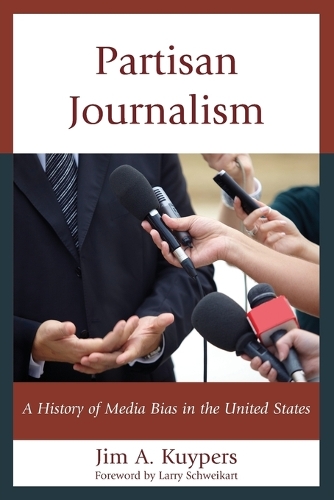
Partisan Journalism: A History of Media Bias in the United States
(Paperback)
Publishing Details
Partisan Journalism: A History of Media Bias in the United States
By (Author) Jim A. Kuypers
Foreword by Larry Schweikart
Bloomsbury Publishing PLC
Rowman & Littlefield Publishers
17th June 2015
United States
Classifications
General
Non Fiction
News media and journalism
Social and cultural history
302.230973
Winner of Choice Outstanding Academic Titles 2014
Physical Properties
Paperback
320
Width 154mm, Height 228mm, Spine 20mm
440g
Description
In Partisan Journalism: A History of Media Bias in the United States, Jim A. Kuypers guides readers on a journey through American journalistic history, focusing on the warring notions of objectivity and partisanship. Kuypers shows how the American journalistic tradition grew from partisan roots and, with only a brief period of objectivity in between, has returned to those roots today. The book begins with an overview of newspapers during Colonial times, explaining how those papers openly operated in an expressly partisan way; he then moves through the Jacksonian eras expansion of both the press and its partisan nature. After detailing the role of the press during the War Between the States, Kuypers demonstrates that it was the telegraph, not professional sentiment, that kicked off the movement toward objective news reporting. The conflict between partisanship and professionalization/objectivity continued through the muckraking years and through World War II, with newspapers in the 1950s often being objective in their reporting even as their editorials leaned to the right. This changed rapidly in the 1960s when newspaper editorials shifted from right to left, and progressive advocacy began to slowly erode objective content. Kuypers follows this trend through the early 1980s, and then turns his attention to demonstrating how new communication technologies have changed the very nature of news writing and delivery. In the final chapters covering the Bush and Obama presidencies, he traces the growth of the progressive and partisan nature of the mainstream news, while at the same time explores the rapid rise of alternative news sources, some partisan, some objective, that are challenging the dominance of the mainstream press. This book steps beyond a simple charge-counter-charge of political bias in the news in that it offers an argument that the press in America, except for a brief period, was essentially partisan from its inception and has returned with a vengeance to its original roots. The final argument presented in the book is that this new development may actually be healthy for American Democracy.
Reviews
How does one even begin to open a scholarly discussion of news media bias in a landscape that has become so proliferated with bias that it now has its own category, 'partisan journalism' This is the challenge for educators and students, and Kuypers starts by leading readers through the highly partisan roots of US newspapers' initial popularity surge (in the 1820s). He shows how the party presses of the medium's nascent days were not unlike Fox News or MSNBC today. (Objectivity, one learns, arose from scientific empiricism and good business: a practical, inoffensive way to serve large, diverse audiences.) Kuypers's clearheaded, highly insightful, and deeply researched volume takes the reader through all the ages of US journalism--through wars, presidents, and the ebb and flow of various media platforms. He even devotes a full chapter to the rise of alternative media. Partisan Journalism, which culminates with a chapter titled 'The 2010 and 2012 Elections,' is an extremely valuable and highly readable resource. Kuypers's examination is thorough, historically potent, and enlightening. Summing Up: Highly recommended. All readers. * CHOICE *
A major strength of this book is the sheer volume of data to back up his claims.... [I]t is very good scholarship. * Communication Research Trends *
In Partisan Journalism: A History of Media Bias in the United States, Jim Kuypers has written one of those rare books that is designed to actually stimulate thought among scholars, news professionals and the news reading/viewing (and now tweeting and blogging) public. His analysis of the origins, rise, variations and modern incarnations of the partisan press is both scrupulously detailed and wittily pointed. More than just a history or a critique, Kuypers explains and contextualizes events, ideas and people who shaped our modern media world. The book willI hopeincite controversy and counter-argument and thus spur a renewed debate on what constitutes a free and fair press in a representative republic. -- David D. Perlmutter, Dean and Professor of the College of Media & Communication, Texas Tech University, and author of Blogwars: The New Political Battleground
Author Bio
Jim A. Kuypers is an associate professor of communication at Virginia Tech. He is the author or editor of nine books, including Twentieth Century Roots of Rhetorical Studies, Bushs War: Media Bias and Justifications for War in the Terrorist Age and Rhetorical Criticism: Perspectives in Action. He is a former editor for the American Communication Journal. He is the recipient of the American Communication Associations Outstanding Contribution to Communication Scholarship Award, the Southern States Communication Associations Early Career Research Award, and Dartmouth Colleges Distinguished Lecturer Award. His research interests include meta-criticism, the moral/poetic use of language, and political communication, particularly ways that the news media influence political understanding
